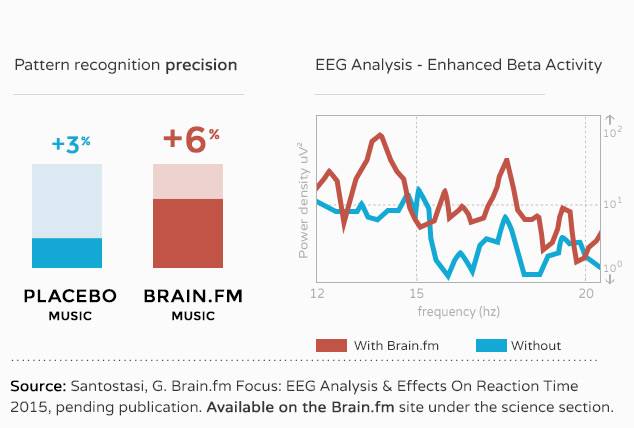Music is extremely powerful. We all accept that it can affect our emotions and the way we feel, but science is showing that it has more direct effects on the brain as well, particularly when it is paired with wearables devices.
Brain.fm is a freemium auditory program designed to help people either focus, relax or sleep using AI-generated music. It’s users include students, insomniacs and athletes. Heavily steeped in scientific research, its creators have a history in making niche audio brainwave software for psychologists and researchers and their work includes patents on auditory brainwave stimulation and memory.
See also: IoT disrupts the Tour de France
I spoke to Brain.fm co-founder Adam Hewett, client and Olympic athlete Robby Smith, and Junaid Kalmadi, who looks after business development for Brain.fm. Smith is using Brain.fm as part of his preparations for the 2016 Rio Olympics.
How does Brain.fm work?
Hewett explained their work is based on a number of audio principles that are combined using AI:
“First, if you’re listening via earbuds or headphones, you’ll notice right off the bat that the sounds seem as if they are moving around your head. The sounds will start out on the side but will move to where they seem as if they are coming from the front, about a book’s length or screen’s length away. This helps focus you on the task in front of you. In the case of relaxation or sleep, the sounds will seems as if they are swirling all about you, and this can simulate the way it feels to sway in a hammock or rock in a cradle, because the brain picks up balancing cues from the ears. It’s the first thing you’ll notice when you use Brain.fm.
Next, we employ two little known auditory principles called Dynamic Attending Theory and ‘entrainment,’ where rhythms appear to have a more direct effect on the brain. You’ll notice that the rhythm is very consistent and that you quickly fall into a mental rhythm yourself – it’s easy to get into the “zone” using Brain.fm, and lose track of time as you focus on your work. But it’s not just the rhythms that you hear that matter: there are also very rapid, very precise rhythms embedded into the sound. You probably won’t even notice them, but if you try you may hear tiny flutters in the sound here and there. These modulations produce a direct effect on the brain that we can examine and confirm using EEG and MRI tests.
The AI is necessary because we wanted the music to be good! And good music is extremely complex to compose. In order to make these principles work for us, we had to find a way to synchronize every single note and beat to the goal of the session, with millisecond precision. It started out as an algorithm, but it rapidly became apparent that we needed something smart – something that could actually compose the music.”
Even athletes need to learn to focus and relax
Robby Smith, the U.S. Olympic wrestling team captain, is a Brain.Fm client. He explained how it’s been helpful in relaxation and sleep inducement:
“I listen to Focus and Relaxation when I’m lifting weights – those sessions help me focus and have the right intensity I need at that moment in time. As an athlete, the closer you get to a tournament the mind begins to work non-stop and it’s hard to shut it down. So in bed trying to fall asleep, my mind thinks about every single scenario and I’m constantly dreaming about wrestling with little restful sleep. Ever since I started using the sleep option in brain.fm, I’ve been completely off melatonin and sleep aids. It’s been my go-to tool to fall asleep since I began few months ago.
For meditation, I combine brain.fm with breath work or simply relax when I have a short 20 to 30 minute window. I prioritize letting my body relax every day, so I usually lay on my back, focus on my breathing and listen to brain.fm’s relax or meditation sessions2
He even has a particular routine in preparation for the Olympics:
“I listen to the focus sessions before practice to help me get ‘in the zone,’ and then after practice, I can come to my room and use the Relaxation sessions to focus on my breath and calm myself down, because I don’t need to be at that high intensity level all the time. I also use the sleep sessions to help myself fall asleep at night, which is very important for recovery from practice each day.”
While Brain.fm’s program is validated by science, I was curious to learn how about how the team was able to make their idea financially viable. We often hear that marketing software in a crowded market place. Kalmadi explained:
“In November 2015, we did a soft launch with Brain.fm on three early adopter communities: AppSumo, Product Hunt and Hacker News. With AppSumo, we sold $300k of Brain.fm product in a week and acquired over 11,300 customers. With Product Hunt, we hit the top 50 most up-voted product of over 20,000 products on the internet. With Hacker News, we were were up-voted #1 for 24 hours. These three launch moments generated enough word-of-mouth buzz enabling us to grow to $45k in monthly revenue.”
According to Kalmadi, the biggest challenge for Brain.fm has been making the tangible benefits of their product apparent in as shorter period of time as possible:
“In the earlier versions of Brain.fm it required weeks or even months of consistent listening in order to notice the differences. After 15 months of tinkering, we’ve now advanced the core technology to the point where users experience the benefits of deeper focus, reduced stress and restful sleep in the first 10-15 minutes of listening.”
Does it work for us mere mortals?
You can try Brain.fm for free a number of times before payment is required. Most writers are terrible procrastinators and I’ve only tried it once but was rudely interrupted by my cat walking across the trackpad of my laptop thus stopping the music. I’ll definitely be giving it another go…when my cat’s asleep.
Brain.fm will be launched in app form in the near future and it’s seems highly applicable with a range of connected devices to aid and monitor sleep and manage focus. The developers are currently working with working with neuroscientists at Wesleyan University to release a landmark study on Brain.fm’s results on the brain which will hopefully lead to future collaborations and opportunities.



















